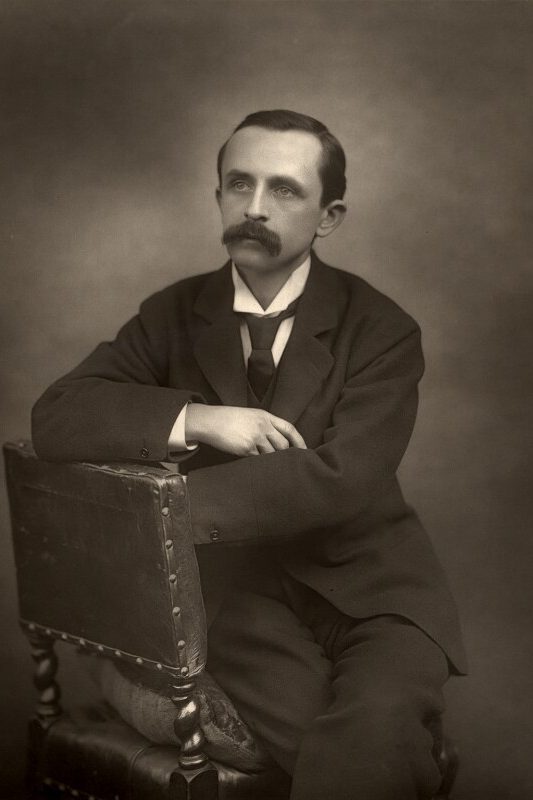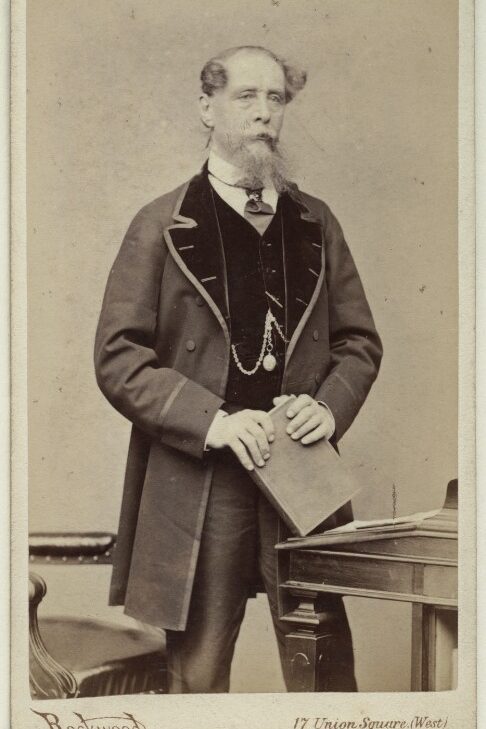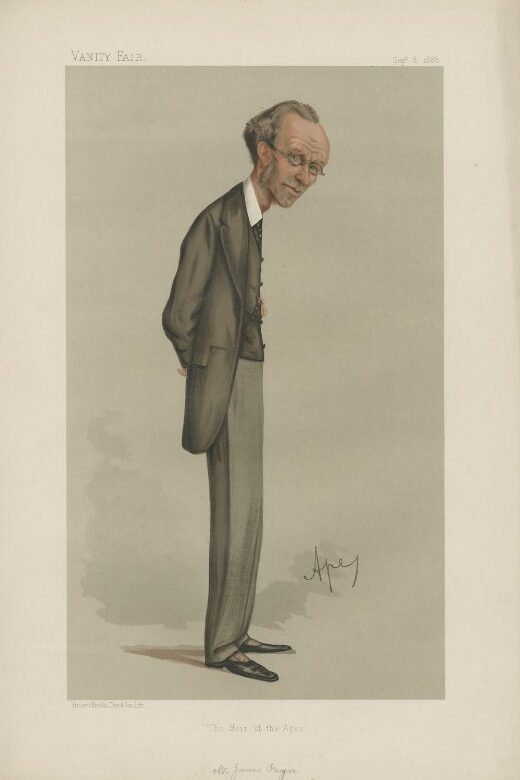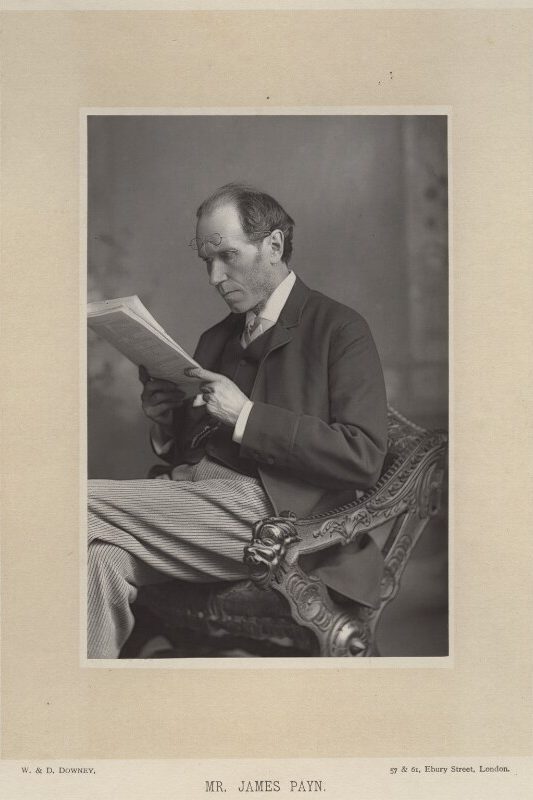Serialised fiction in the Bolton Weekly Journal – For Cash Only (1881-82) by James Payn
James Payn’s novel For Cash Only 1882 was first serialised in the Bolton Weekly Journal in weekly instalments between August 1881 to March 1882 (Troy J. Basset, 2020).
James Payn 1830-1898 was an English poet and author (The British Museum, 2021). He studied at “Eton and at the Royal Military Academy Woolrich B.A. Cambridge, 1853. While he was an undergraduate, he brought out two volumes of poems; and began sending verse and prose to periodicals” (Lohrli, 1971).
Three of his novels were serialised in “A.Y.R under editorship of Charles Dickens. Payn himself is said to have wrote that Dickens was “the chief figure” in his “literary pantheon” of early years, and that his meeting him in 1856 was “an epoch in my existence”. Some thirty years later he wrote that he still felt for Dickens “the same love and admiration” that he had for him” (Some Literary Recollections, pp 179-84, as qtd in Lohrli, 1971).
My research on For Cash Only has led me to believe that James Payn was an admired writer due to his style and characters. In his 1906 study, Victorian Novelists, Lewis Melville reflects on James Payn’s work and legacy, remarking that ‘he had and still has many admirers’ but asks will Payn’s name be remembered ‘in fifty years?’ Speculating, Melville notes J.M. Barrie’s enthusiasm for Payn, who allegedly declared:
‘If I were an American millionaire and could afford to keep a novelist of my own, I would first offer the appointment to Mr. Payn […] No brighter, shrewder, manlier writer touches paper. His very name puts one in good humour like the sound of the dinner-gong’ (Melville, 1906, p.281).
Payn’s fiction was likewise appreciated at the time of publication. Writing of For Cash Only, an anonymous critic for the Saturday Review wrote that “there are certain qualities which one may with tolerable certainty look forward to finding in any book which is written by Mr. James Payn.” Commenting further that “He gives us now a novel of startling incident; now a collection of stories which, whatever their faults may be, are at least full of fun; and again, as in present instance, a tale in which “unexpectedness” is cleverly mixed with easy drawing of character, which, if not as deep as a well, is lifelike enough to arrest and amuse the readers attention. When Mr Payn has need of the services of a rouge, he does not hesitate to make him an “out and outer” (‘For Cash Only’, 1882, p.504).
An advertisement publicising For Cash Only in the Times reads, “Mr Payn is lively as ever in his latest story. There are sketches of character most cleverly contrasted, drawn from a wide acquaintance with the world; while the sparkling dialogue is gemmed with good things, with apposite anecdotes, and with happy illustrations.” (‘Advertisement’, 1882, p.4)
Purcell wrote of Payn’s novel For Cash Only in The Academy that “Mr. Payn winds up this time, not with the usual tear-sprinkled orange-blossoms, but with a joke by no means so bad at the expense of his black sheep, Percy, who deserted by his wife, sank to the level of the turf, if not a little below it.” (1882, p.281)
He includes an excerpt from the novel “‘They say’, said Herbert ‘that he has become a welcher.’ ‘Dear me!’ sighed Miss Darrell- who though she had been a schoolmistress, did not know everything- ‘how curious!’ ‘I suppose he has changed his nationality to avoid recognition.’”
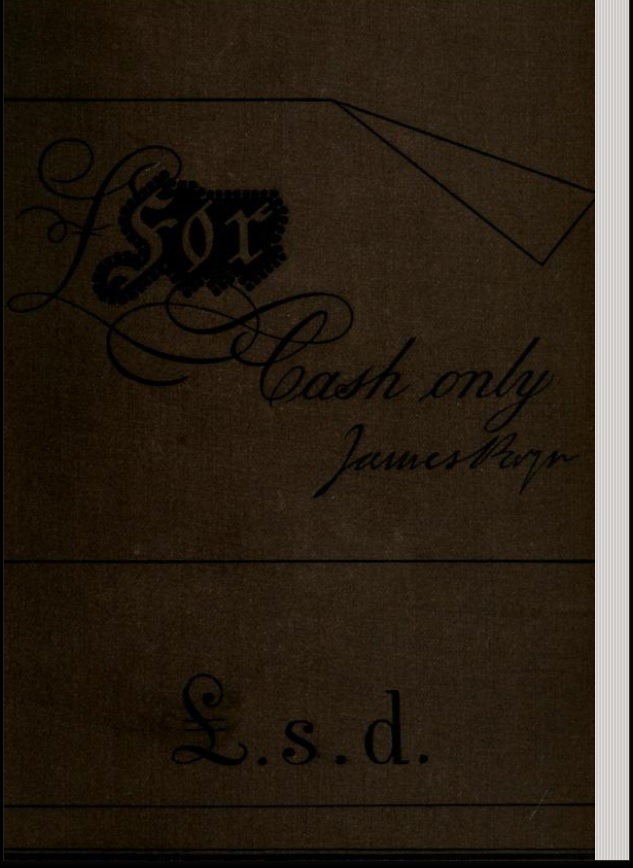
Purcell writes that “the other villain of the piece has been already disposed of in a shipwreck, and the moral young engineer triumphs in peace. The scene is laid in a smoky Lancashire town, where Sir Peter Fibbert presides over the cotton-spinning plutocracy. His newly coined family motto “in medio tutissimus ibis,” suggests the title of the book.” He notes further that “Mr Payn’s young ladies are by no means going off yet, nor has the author lost any of his high spirits and lively style of narration. To this he owes much of his popularity with those who do not object to pretty frequent doses of flippancy and smartness, and a rather unfair amount of padding” (1882, p.281).
As with most works of fiction, not every reviewer finds himself a fan of otherwise highly praised novels. An anonymous reviewer for The Athenaeum wrote that:
“Mr Payn is another industrious author whose most recent work is below his average. Even his accustomed high spirits seemed to have flagged in the writing of For Cash Only. Many a poor joke becomes laughable if it is repeated often enough, as the clowns know; but some jests cannot be made to live by any amount of repetition. In this book there is an old young man of the world who is insufferable, his vanity and infinite insincerity are intended to provide the humorous part of the work; but he is, in fact, only a caricature which is not amusing” (‘Mount Royal’, 1882, p.566).
He does concede though that “there are some good scenes” (‘Mount Royal’, 1882, p.566).
Bibliography
Anon. (1882) For Cash Only. Saturday Review of Politics, Literature, Science and Art. [Online] April 1882 (1382). pp.504-505. Available at: <https://www-proquest-com.ezproxy.bolton.ac.uk/britishperiodicals/docview/9408825/47F3973DBE604E5BPQ/1?accountid=9653&imgSeq=1> [Accessed on 5 May 2021].
Anon. (1882) Mount Royal. The Athenaeum [Online] May 1882 (2845) p.566. Available at: <https://www-proquest-com.ezproxy.bolton.ac.uk/britishperiodicals/docview/8962631/47F3973DBE604E5BPQ/14?accountid=9653&imgSeq=1> [Accessed on 5 May 2021].
Anon. (1882) Advertisement. Times. [Online] June 1882. (502) p.4. Available at: <https://www-proquest-com.ezproxy.bolton.ac.uk/britishperiodicals/docview/6253977/47F3973DBE604E5BPQ/44?accountid=9653> [Accessed on 5 May 2021].
Barraud, Herbert Rose. (1892) J.M. Barrie. [Online photograph] Available at: <https://www.npg.org.uk/collections/search/portrait/mw56818/JM-Barrie?> [Accessed 24 May 2021].
Bassett, T. (2020) At The Circulating Library Title Information: For Cash Only. [Online] victorianresearch.org. Available at: <https://www.victorianresearch.org. atcl/show_title.php?tid=903&aid=72> [Accessed on 5 May 2021].
Downey, W & D. (1890) James Payn. [Online photograph] Available from: <https://www.npg.org.uk/collections/search/portrait/mw121738/James-Payn?LinkID=mp85874&role=sit&rNo=2> [Accessed 20 May 2021)
The British Museum (2021) James Payn. [Online] Available at: <https://www.britishmuseum.org/collection/term/BIOG159373> [Accessed on 5 May 2021].
Lohrli, A. (1971) Dickens Journals Online. [Online] Available at: James Payn (djo.org.uk) [Accessed on 5 May 2021].
Melville, L. (1906) Victorian Novelists. London: A. Constable. [Online] Available at: <https://archive.org/details/victoriannovelis00melvuoft/mode/2up> [Accessed 20 May 2021].
Pellegrini, Carlo. (1888) James Payn (‘Men of the Day. No. 409’). [Cartoon] In: Vanity Fair 8 September, 1888. [Online] Available from: <https://www.npg.org.uk/collections/search/portrait/mw258145/James-Payn-Men-of-the-Day-No-409> [Accessed 20 May 2021].
Purcell, E. (1882) New Novels. The Academy. [Online] April 1882. (520) p.281-282. Available at: <https://www-proquest-com.ezproxy.bolton.ac.uk/britishperiodicals/docview/8143023/47F3973DBE604E5BPQ/15?accountid=9653&imgSeq=1> [Accessed 5 May 2021].
Rockwood, George Gardner. (1867) Charles Dickens. [Online photograph] Available from: <https://www.npg.org.uk/collections/search/portrait/mw126341/Charles-Dickens?LinkID=mp01294&search=sas&sText=Charles+Dickens&displayNo=60&role=sit&rNo=55> [Accessed 20 May 2021].

